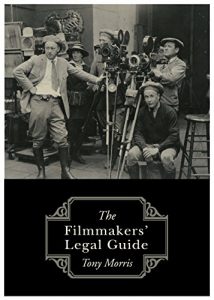About the Filmmakers’ Legal Guide
There is an infinite number of legal matters on which producers seek advice. Nevertheless, certain questions frequently arise: is permission required to use material from a book? Does a contract have to be in writing? May classical music be used in the background of a scene? Does an interviewee need to sign a release. The Filmmakers’ Legal Guide addresses the practical legal requirements of those making movies, documentaries, shorts, television programmes and other audio-visual content. Divided into five parts, the Guide addresses in turn: content, rights, an overview of contracts, cast and crew agreements and, finally, production contracts. Key issues are analysed and explained in a clear and logical manner concentrating on the practical needs of producers.
“Tony Morris has created The Filmmaker's Legal Guide … a book (that is) … blindingly clear and easy-to-understand as this one. … Tony makes the complicated simple … The Filmmaker's Legal Guide is quite simply the most essential resource a filmmaker can have. Where anyone can do a tutorial on how to run a camera or a new piece of software, nowhere else can you find such relevant and useful information about the legal side of things. Get the practical legal issues wrong and the film you create is nearly useless.”
Elliot Grove
Founder, Raindance Film Festival & British Independent Film Awards
About the Author
Tony Morris graduated in law from Manchester University and has many years of experience of working as a solicitor in private practice. He advises clients active across a broad spectrum of the media, entertainment and technology industries. He is retained by film and television producers, film sales agents, distributors, satellite and online broadcasters, record companies and music publishers, musicians and bands, talent agents and managers, commercial and entertainment software creators and providers as well as individual creatives. Tony has lectured at Film Schools across Europe and published numerous articles and opinion pieces. He is also a member of arbitration panel of the Independent Film & Television Alliance.
There is an infinite number of legal matters on which producers seek advice. Nevertheless, certain questions frequently arise: is permission required to use material from a book? Does a contract have to be in writing? May classical music be used in the background of a scene? Does an interviewee need to sign a release. The Filmmakers’ Legal Guide addresses the practical legal requirements of those making movies, documentaries, shorts, television programmes and other audio-visual content. Divided into five parts, the Guide addresses in turn: content, rights, an overview of contracts, cast and crew agreements and, finally, production contracts. Key issues are analysed and explained in a clear and logical manner concentrating on the practical needs of producers.
“Tony Morris has created The Filmmaker's Legal Guide … a book (that is) … blindingly clear and easy-to-understand as this one. … Tony makes the complicated simple … The Filmmaker's Legal Guide is quite simply the most essential resource a filmmaker can have. Where anyone can do a tutorial on how to run a camera or a new piece of software, nowhere else can you find such relevant and useful information about the legal side of things. Get the practical legal issues wrong and the film you create is nearly useless.”
Elliot Grove
Founder, Raindance Film Festival & British Independent Film Awards
About the Author
Tony Morris graduated in law from Manchester University and has many years of experience of working as a solicitor in private practice. He advises clients active across a broad spectrum of the media, entertainment and technology industries. He is retained by film and television producers, film sales agents, distributors, satellite and online broadcasters, record companies and music publishers, musicians and bands, talent agents and managers, commercial and entertainment software creators and providers as well as individual creatives. Tony has lectured at Film Schools across Europe and published numerous articles and opinion pieces. He is also a member of arbitration panel of the Independent Film & Television Alliance.






